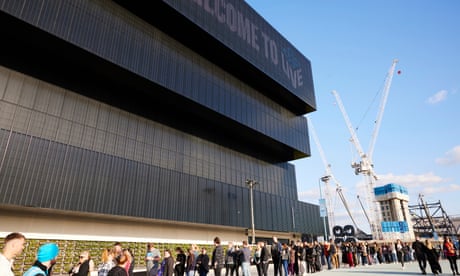
The boss of Manchester’s beleaguered Co-op Live arena has resigned in its opening week after tickets were cancelled and gigs rescheduled because the venue was not ready on time.
Gary Roden quit as general manager of the new arena after also being criticised for saying some small music venues were “poorly run”.
The 23,500-capacity arena was due to open officially three days ago with two shows by the comedian Peter Kay on Tuesday. The gigs were moved to next week, with a “truly gutted” Kay apologising to fans and joking he would “have to miss my bums and tums class” to make the new dates.
The venue held its first gig last Saturday, with Rick Astley as a surprise guest, performing to 11,000 arena workers, VIPs and press at a free test event.
The show experienced problems including the cancellation of as many as 4,000 tickets, some one hour before the show, which left people “fuming”.
Ticket holders were told they could attend a gig a week later by the US rock duo the Black Keys instead.
A Co-op Live statement thanked Roden for his “help bringing the UK’s newest arena to live entertainment fans and wish him the best for the future”. It said it was appointing Rebecca Kane Burton, who previously ran London’s O2 Arena, as interim general manager.
Sited on the Etihad campus next to the Manchester City football ground, the £365m venue is scheduled to host Take That, the Killers, Eric Clapton, Barry Manilow and Olivia Rodrigo in the coming weeks, with plans to hold the MTV Europe music awards there in November.
Construction began in 2021 on the venue, which is financed by the City Football Group – owned by the billionaire Emirati Sheikh Mansour bin Zayed Al Nahyan – and the US sports and commercial real estate conglomerate Oak View Group.
While it was welcomed by city leaders, questions have been asked about whether another large-scale music venue is needed, just 2 miles from the 21,000-capacity Manchester AO arena.
Co-op Live, which contains several smaller gig rooms, was criticised for declining to sign up to a £1-a-ticket levy that funds the Music Venue Trust’s (MVT) “pipeline investment fund” for grassroots venues.
Roden told the BBC the levy was “too simplistic”, adding that some venues were poorly run and there was no robust system to decide who got the levy.
The venue later distanced itself from his comments, saying they did not represent the views of the company.
In response, the MVT told NME it was ”disrespectful and disingenuous to suggest” small venues were poorly run.
It said: “Obviously, the irony of making ill-judged, unnecessary and misleading comments about grassroots music venues on the day that the launch of their new arena has unfortunately fallen into such difficulties is not lost on anyone in the music industry, on artists, or on audiences.”